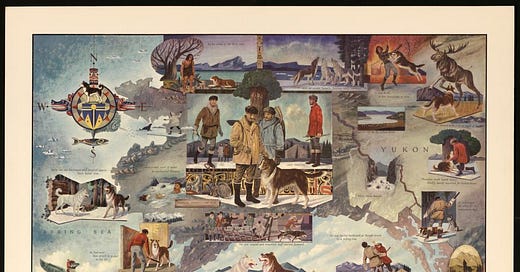Book Review: The Call of the Wild (London)
I don't think Jack London would approve of breeders coming up with things like F1b Golden-doodles (the breed of my dog, Harper).
I don’t recall reading Jack London’s The Call of the Wild before, although I may have read excerpts from it in a high school or college literature class.1 Nor have I seen the film adaptations. I finally got around to it, and I really enjoyed the story.2
At a surface level, The Call of the Wild finds a place next to other great dog stories, like Fred Gibson’s Old Yeller and Sheila Burnford’s The Incredible Journey (adapted to film by Walt Disney as Homeward Bound: The Incredible Journey). The representations of the deep love shared between Buck and his final “owner” will resonate with dog owners, but really, anyone can get caught up in this story.
I don’t like attempts to sum up a novel, even one as short as The Call of the Wild. But basically, the story centers on the life of a singular dog, Buck. Bred in captivity and raised for domestic pleasure rather than utilitarian value, Buck was dognapped and forced into servitude as a sled dog. As the novel progresses, Buck becomes increasingly aware of his wild ancestry, adapting first to his role as a sled dog and then, in his self-actualization (or doggy deification), to the leader of a pack of wolves in the frozen north.
The book explores the powerful allure of nature, not just for dogs but also for humans. London portrays the most civilized aspects of society as the weakest and, ultimately, the least humane. Surprisingly, it is not civilization, but the call of the wild—a return to nature—that offers a remedy for dehumanized people.
London also explores the unique and varied relationships between humans and their dogs. It’s hard to say, but I think he would disapprove of the sciency dog people who figured out how to breed canines like our F1b Goldendoodle. People like this basically de-dog dogs (to recall D. A. Carson’s famous phrase, “the de-Godding of God), transforming otherwise wild animals into domestic pets. Despite feeling his disapproval, I found a way to enjoy spending time with my dog while listening to this novel.
Like every good author, London avoids the kind of preachiness that often characterizes lower-quality stories, which overtly promote an agenda to the point that the story is stripped of both power and pleasure. Beyond whatever London’s concerns might be about the domestication of dogs and the power of nature to combat society’s deading effects on humans, The Call of the Wild is just a good story.
Editorial Note: A friend read this review and informed me that we read portions of this story out loud in a highschool literature class. While I’m sure those readings were impactful, I apparently have lost all memory of them.
Please note that I listened to it on Audible, read by Pablo Schreiber. I listened to this book while grinding a massive silver maple stump in our back yard with Harper watching on.





This is great!